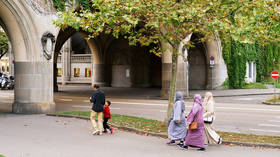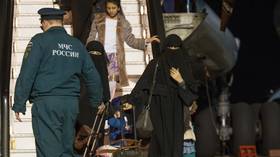European country announces ‘burqa ban’ start date

A ban on wearing face coverings in public places in Switzerland will enter force on January 1, 2025, the government has announced. The contentious measure, widely known as the “burqa ban,” was approved in a nationwide referendum two years ago.
The date for the ban to come into effect was set by the Federal Council, the highest executive authority in Switzerland, at a meeting on Wednesday. Anyone who covers their face in public throughout the country will be punished with a fine of up to 1,000 Swiss francs ($1,141), the government said in a statement.
The ban applies to Muslim garments (burqa and niqab) and to ski masks and bandannas used by protesters.
The ban does not cover airplanes, diplomatic and consular premises, and places of worship, the government said. Face coverings are also permitted for reasons of health, safety, climatic conditions and local customs, as well as for artistic and entertainment performances and for advertising purposes, the statement added.
The referendum in March 2021 was held as a result of a popular initiative, ‘Yes to the ban on face coverings’. The proposal was approved by 51.2% of Swiss voters and then adopted by the parliament in September 2023. The proposal was backed by the right-wing Swiss People’s Party, the largest group in parliament.
The Swiss government had opposed the measure as excessive, arguing that the ban could harm tourism. Most Muslim women who wear veils in Switzerland are visitors from Persian Gulf states, the AP noted.
The ban was also condemned by Muslim associations in the country.
Out of the permanent resident population aged 15 and over, which totals about 7.5 million people, 5.7% are Muslim, according to Switzerland’s Federal Statistics Office (FSO).
Bans on the burqa, a full body covering with mesh around the eyes, and the niqab, a face veil which leaves a slit for the eyes, are in place in France, Austria, Belgium, Bulgaria, Denmark, Italy, the Netherlands, and Spain.













